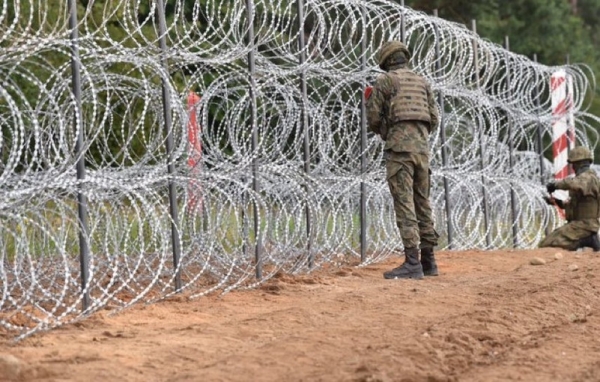Border fences are an indictment of EU state asylum failures
The past few years have seen EU states erecting fences and barriers along their borders in record time.
Between 2014 and 2022, the aggregate length of border fences at the EU’s external borders and within went from 315km to 2048km.
The EU’s external border alone is over 12,000 km. Around 13 percent of that is entirely fenced off, according to a European Parliament brief.
Migration has once again ventured into the political debate at an EU summit on Brussels on Thursday (9 February). And along with it, come the usual tropes of solidarity and border security.
But this time around, the political mood has clearly shifted in favour of security over safety of those seeking international protection.
Ahead of the EU summit, Mark Rutte, the Dutch prime minister, said that the debate almost looks like "we want to build a great Berlin Wall around the European Union."
Amid the collapse of a functioning internal EU asylum system and stalled reforms, the EU and its leaders are appearing increasingly desperate.
A dead baby
Overcrowded asylum centres in the Netherlands made international headlines when a three-month baby died at an emergency shelter last year. In Brussels, home to the EU institutions, an estimated 7,000 people seeking asylum are said to be homeless and sleeping rough.
Similar stories can be found elsewhere amid striking reports of abuses and miscarriages of justice, including wrongfully imprisoned refugees in Greece.
Yet the latest draft EU summit conclusions devote six paragraphs to the "control of EU external borders". Two years ago, the EU summit had a single sentence.
The same two years have instead been spent bickering over internal EU asylum reforms under the pretext of progress.
But with little to show for it, the EU and its member states are turning towards shoring up borders and outsourcing their failures to the Western Balkans, north African countries, and elsewhere.
Closer to home, the push for the EU to finance walls and their various iterations has never really gone away.
The same demand was already made in 2021 by Austria, Bulgaria, Cyprus, the Czech Republic, Estonia, Denmark, Greece, Hungary, Lithuania, Latvia, Poland and the Slovakia.
The bid was made again on Thursday by Estonia’s prime minister Kaja Kallas. The European Commission has refused, preferring instead to finance drones.
But it has also been repeated numerous times by Manfred Weber, the leader of the centre-right European People’s Party (EPP).
"Fences, in exceptional cases, are not taboo for us. We must restore order at Europe’s external borders," he said.
The socialists, greens, the left and the Renew Europe liberals have described those ideas as a dead end. "Walls are a gross waste of public resources, with little to no effect," said Dutch liberal Sophie in ‘t Veld, in a statement.
The costs are enormous. Poland spent €353m for a 186km border wall along Belarus. It has not gone down well.
The regional president of Terespol, Krysztof Iwaniuk, who also lives in a town of the same name that straddles the Belarus border along the Bug river, told EUobserver that the wall doesn’t make any sense.
"It gives me the chills," he said, last year.
A similar conclusion was made by the Migration Policy Institute think-tank. Walls tend to re-reroute people and increase profits for smugglers and bolster organised crime, said one of their studies.
More of the same
Today’s push for more fences and walls is instead an indictment of failed EU asylum policies and various attempts at reforms that have for years failed to materialise.
"What we need is a humane asylum policy based on solidarity and responsibility-sharing between member states, as well as safe and legal pathways to the EU," said German Left MEP, Cornelia Ernst.
It also follows fears that Belarus and Turkey (and Morocco) will send thousands across the borders in an effort to destabilise Europe. And it comes after a 2020 controversial ruling by the European Court of Human Rights, which condoned collective pushbacks in a case dealing with the Spanish-enclave of Melilla.
The case has been cited by Greece and others amid numerous reports of pushbacks along its land and sea borders, a charge they have always denied.
Demands for more legal pathways are also being made, not least because Europe needs migration to offset an ageing demographic.
"We have a common interest in ensuring that those we need for our labor markets also come here," said Germany’s chancellor Olaf Sholz, also on Thursday.
The draft EU summit conclusions also cite legal migration — as leverage to get countries to take back their nationals.

